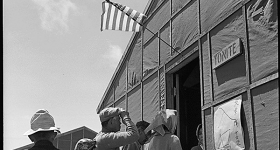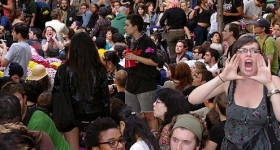Much as I hated having to read the entire smug business that is Amy Chua's book-promoting article, there was no way around it.
And much as I hate giving the writer more press, it's not an option to say nothing as, dangerously, she proselytizes to others her "Chinese mothering" strategies. Her piece opens like this:
A lot of people wonder how Chinese parents raise such stereotypically successful kids. They wonder what these parents do to produce so many math whizzes and music prodigies, what it's like inside the family, and whether they could do it too. Well, I can tell them, because I've done it. Here are some things my daughters, Sophia and Louisa, were never allowed to do:
• attend a sleepover
• have a playdate
• be in a school play
• complain about not being in a school play
• watch TV or play computer games
• choose their own extracurricular activities
• get any grade less than an A
• not be the No. 1 student in every subject except gym and drama
• play any instrument other than the piano or violin
• not play the piano or violin.
Oh look, that's my childhood. No, really. Point for point, that is my childhood.
And you know, for a long time it worked. My parents had one daughter acing calculus in tenth grade. Another graduating top of her class. True, school's not that hard when you have Nothing Else to Do.
That was a number of years before I tried to step off a bridge, though.
So here's the thing: I thought about writing a lengthy rebuttal to this article but you know, it's not all that. It's not even all that original. Model minorities have been playing the support role in this Save the Doomed Western Family drama for some time now.
Moreover, if you're reading this column, odds are you're already thoroughly familiar with the potentially horrific effects of Chua's parenting style. It's all around you in your community, and you have friends who are falling apart. But perhaps you are currently too traumatized to explain, for other people's benefit, why they should not purchase and follow her childrearing manual.
If so, I'll try to help by providing a few pithy rejoinders.
Rejoinder number one: It's a high-stakes gamble.
Sometimes this gamble pays off in the long run. And when it does, as another blogger's response has pointed out, it makes you rich. Neurosurgeons, corporate attorneys, and investment bankers have plenty-rich parents, you betcha. And let's be honest here, Asian America does have a disproportionately high number of MDs, JDs, and MBAs. Like I said, school's not that hard if.
But sometimes you lose this gamble, and when you lose, you lose big. Because you've gone all-in. Left the kid no room to make friends, no identity outside of your ambitions, no tools or skills with which to make his or her own decisions in life without you -- and no margin of error.
You have raised this kid to believe that the kind of kid who fails at something is not the kind of kid you want. You have most likely said so to him or her, in no uncertain terms. If you can't have a child worth rubbing in your friends' faces, you'd rather have no child at all. And, your kid believes this of you. Because -- not every day, and maybe never all of you -- but in some part of your heart it's true: you would throw your child away.
Kids can't be bluffed, you know. The threats only work if, in some terrifying corner, you mean them.
As others have pointed out, Chua's kids are still young.
Which leads me to rejoinder number two: We'll see.
* * *
More responses (embedded above: Betty Ming Liu, Nikkei View, and Resist Racism):
p.s. Thanks to our readers for sending the article this way.
Ask a Model Minority Suicide is
a Hyphen series on mental health. Introductory post
here.
Resource Guide here.
Go here
to see all posts in this series.
Comments, questions, or stories can be posted below -- or sent privately to Sam at aamms[at]hyphenmagazine[dot]com.









Comments
Glad you'll be getting a free review copy, Grace. :)
Hi, Elise. Unfortunately there's not a whole lot of research demonstrating this yet -- but I suspect there soon will be. The figures about the alarming suicide rate among Asian American women 15-24 came out only a few years ago, but since then the topic has been getting attention it needs and never saw before. Check out the comment threads on the various websites responding to Chua, though, and you'll see pressure and depression paired over and over again. See also this:
http://www.sfwar.org/pdf/Suicide/SUI_CNN_05_07.pdf
Thanks for reading.
Hi, Cynthia. Enjoyed your post -- esp. the last page.
And agreed: one of the most dismaying things for me when I first read the essay was the realization that Chua is SECOND generation, not first. I'd hoped this kind of parenting was specific to the hardship immigrant generation -- but apparently not. That "we" in the 2nd gen are just as capable of it, is a terrible thought.
Hi, everyone. I've just obtained a copy of the book to check out for myself, and will come back with a report. But Jeff Yang's take on things is pretty steady; I expect I'll find something not too far off from his description -- and so yes, probably more nuanced, funnier, more human and with a different, more tempered message.
However, that doesn't mean that the WSJ piece should not have been judged on its own merit. It was edited into a piece to be circulated and read as a stand-alone; in other words, whatever mysterious entity shaped it did so with the knowledge that a great many (if not most) readers of the article would never buy and read the book.
If there is a major disconnect between the book and the article purported to represent it in excerpt -- that disconnect is not the READERS' fault. We were, if anything, somewhat ill-used in this publicity stunt.
Alright, so I've finished the book and it's as expected. Descriptions from Yang et al. are accurate. And though the responses rage on, I've nothing new to add that 12 other people aren't already saying.
But I stand behind my comments above and this blog post itself as fair and valid responses to the essay.
I agree with your stance, and certainly think a boycott is not out of order, to send the message that it is unacceptable for the various publishing industries to play fast and loose with their readers like this.
Agreed, too, that the broad trend of exoneration Asian Am media (especially! less so non-Asian responders) seem to have given Chua is dismaying: many seem to have let her entirely off the hook. I continue to hold her accountable for her part -- and do not buy her "naive Yale lawyer and previously-published author victim" pose.
But, this column is not about Chua. And so I'd like to get back to the larger issues that the column *is* about -- and that her piece has been, admittedly, useful in igniting in public discourse. Asian Am mental health is front of mind in the community now, and even a blip on the mainstream radar, because of controversy over her piece. The CDC announcement of suicide statistics started this conversation, but it's been ramped up quite a few notches in the last week. As some of the other AsAm bloggers are now saying (http://www.k12newsnetwork.com/2011/01/dear-asian-america-forget-chuas-book-this-is-our-it-gets-better-moment/), and as this column was itself set up to do, let's address Asian families/parenting, overachievement/the model minority mold, and their impacts on the 2nd generation now -- quite aside from Chua.
My mission here is to help people who've been on the striking end of that parenting stick (whether or not they're now thinking of being parents -- often not, precisely because of their upbringings), talk and think and make sense of their experiences, and maybe find a way to live better.
And I'd like to see us tackle these issues, for the first time please, without the gag order against making "our community" look bad. Sometimes "our community" demands that we protect the wrong people. I'd rather my friends live than that their parents (or progressive Asian America) save face.
If there's a boycott or other form of protest you want to organize around Chua/WSJ, you have my support. But she doesn't get to take over this column; it's a more important space than that.
Thanks for calling this to my attention, A. The discrepancies are confusing and in discussions like these, it is in fact important to get the claims straight. I'll look further, ask around, and check back in.
Looks like I need to devote a whole post to this soon.